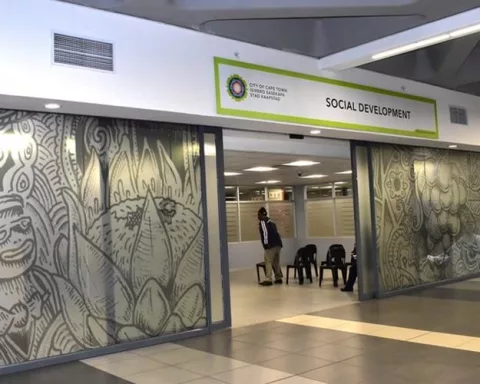A proposed Safe Space shelter for the homeless in Muizenberg has sparked debate. The City of Cape Town has identified a parking lot in Sidmouth Road as the site for the proposed 60-bed shelter, which will be managed by the U-turn welfare organization. However, the location has raised concerns about the impact on tourism and economic activities in the area. Nonetheless, the city has emphasized the need to provide shelter for people who have made public spaces their homes.
New Safe Space Shelter Proposal Stirs Up Muizenberg: The City of Cape Town has proposed a 1,141 square meter parking space in Sidmouth Road, Muizenberg as the location for a Safe Space shelter, offering refuge for the homeless. The City has joined forces with the U-turn welfare organization to manage the shelter, which will provide transitional assistance beyond just a place to rest. However, concerns have been raised about the strategic location of the site potentially discouraging tourism and economic activities.
Nestled between the refreshing winds of the famous Surfers’ Corner beach and the lively hum of surf shops and eateries, a parking lot in Sidmouth Road, Muizenberg is teeming with potential. The City of Cape Town has pinned this site as the location for a proposed Safe Space shelter. This 1,141 square meter parking space has the potential to become a refuge for the homeless, offering them an escape from the harsh realities of street life.
The U-Turn Partnership
The City has forged an alliance with the U-turn welfare organization to manage this proposed shelter, with a goal to furnish at least 60 beds. However, the vision for the shelter extends beyond a mere place to rest. It’s being envisioned as a ‘Safe Space’, a respectful transitional zone replete with an array of social interventions. The aim is to assist homeless individuals transition from street life, breathing a fresh lease of hope into their challenging lives.
On July 15, the establishment of the shelter took a significant leap forward. Sub council 19, which also includes Muizenberg, greenlit a proposal to transition the ownership of the parking lot from the Safety and Security directorate to the Community, Arts, and Culture directorate. This action, supported by the other directorates, represents the city’s unwavering commitment to the project.
Controversies and Concerns
But like any coin, this promising venture has two faces and has stirred up a heated discussion. Simon Roberts, the chair of the Muizenberg Improvement District (MID), has raised concerns about the proposed location. While MID is in full support of the noble mission, they worry that the strategic position of the site might discourage tourism and economic activities.
The significance of the site is of paramount importance to Roberts, who refers to it as “the last available A-grade erf that can be developed to enhance our area”. He further emphasized the need for a thorough public participation process, indicating concerns about the lack of public discourse.
In response to these concerns, City of Cape Town spokesperson Luthando Tyhalibongo acknowledges them but underscores the urgent demand for shelters throughout the city. His stance is that the city has to provide for people who have made public spaces their homes, such as bridges and the Muizenberg park.
The future awaits
Tyhalibongo points to the Western Cape High Court‘s viewpoint that shelters should be stationed close to the areas where the homeless earn their living. He puts forth that this requirement limits the selection of location for ideal shelter space in the city, rendering the parking lot a feasible choice.
As the shelter’s fate hangs in balance awaiting a final decision, Tyhalibongo discloses that U-turn could potentially apply to lease the site. If the City considers the application, the lease would be publicized for public commentary, paving the way for more community engagement in the project.
As this story continues to unfold, it mirrors a lively and dynamic society grappling with important issues. Irrespective of the ultimate decision, the dialogue embodies the perpetual struggle between progress and preservation, social responsibility and economic development, and the formidable power of collective decision-making.
What is the proposed Safe Space shelter in Muizenberg?
It is a proposed 60-bed shelter for homeless individuals in Muizenberg, located in a parking lot in Sidmouth Road. It will be managed by the U-turn welfare organization and is aimed at providing transitional assistance beyond just a place to rest.
Who will manage the proposed shelter?
The U-turn welfare organization will manage the shelter in partnership with the City of Cape Town.
What are the concerns raised about the proposed location of the shelter?
The Muizenberg Improvement District has raised concerns that the strategic location of the site might discourage tourism and economic activities. The significance of the site is of paramount importance to Simon Roberts, the chair of the MID, who refers to it as “the last available A-grade erf that can be developed to enhance our area”.
What is the City of Cape Town’s stance on the proposed shelter?
The City of Cape Town has emphasized the need to provide shelter for people who have made public spaces their homes, such as bridges and the Muizenberg park. They acknowledge the concerns raised but underscore the urgent demand for shelters throughout the city.
What is the Western Cape High Court’s viewpoint on shelters?
The Western Cape High Court believes that shelters should be stationed close to the areas where the homeless earn their living. This requirement limits the selection of location for ideal shelter space in the city, rendering the parking lot a feasible choice.
What will happen if U-turn applies to lease the site?
If U-turn applies to lease the site, the City will consider the application and the lease will be publicized for public commentary, paving the way for more community engagement in the project.












